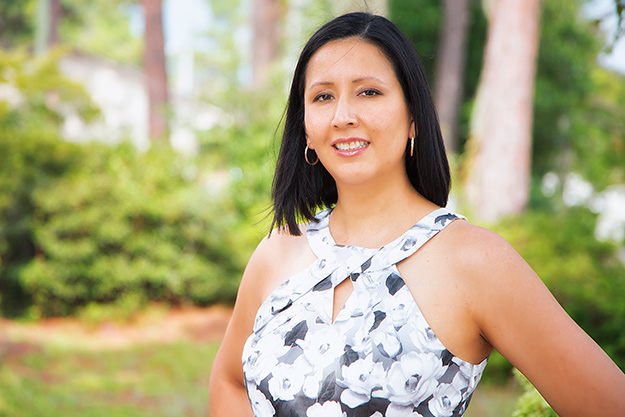Miles of Smiles

Norma Cortez knows how to set things up. As a setter on the Miami Dade College volleyball team, she set the shot up for the spiker, who would pummel the ball over the net to the opponent’s side. She was very good at it, too – she was voted most valuable player in 2002, when the team boasted an undefeated season.
These days Cortez, owner of Cape Fear Smiles in Wilmington, is setting her dental patients up for success, particularly those who speak Spanish.
Cortez says there’s a growing Spanish-speaking Hispanic population in North Carolina, and it may be because of the availability of jobs in hospitality and agriculture in addition to the moderate weather. She says patients like to hear things like diagnoses and educational facts regarding their health in their native language. Many people who speak only Spanish, for instance, will seek service providers who speak the language. Once word got out that she speaks Spanish, Cortez started seeing more Spanish-speaking patients in addition to the English-speaking clientele she and her staff were already serving.
Cortez grew up in Lima, Peru, where she attended a German high school, and playing volleyball was her passion. She wanted to be a physician, but in Peru, the training is grueling and wouldn’t allow her to pursue volleyball. She learned that students in the United States could improve their academic and sporting skills at the same time. She also learned Miami Dade College needed a setter, so she started school there, improving her English skills while playing and studying.
Once she graduated from the two-year program, she began looking at four-year colleges where she could continue her studies to become a physician. University of North Carolina at Chapel Hill was appealing, she recalls, because it has both a good volleyball team and a hospital with which they were affiliated.
While at Chapel Hill, where she eventually earned an undergraduate degree in biology, Cortez met a woman from Peru who became her friend. She was in dental school and she convinced Cortez that dental school might be a better option for her than medical school; the schedule wasn’t as difficult, and afterwards a residency wasn’t required.
Cortez did, in fact, go to dental school and received her doctor of dental surgery degree from UNC in 2011. She worked as an associate dentist in Burgaw before purchasing Cape Fear Smiles earlier this year. The practice was begun in the 1970s by Charles R. Biggerstaff. She is the third owner of the Wilmington practice.
Regardless of her patients’ background and experience, Cortez says if they don’t have a good dental knowledge – meaning they know they must floss every day, brush their teeth at least twice a day, visit their hygienist for regular professional cleanings – they won’t be able to properly care for their teeth, which may later adversely affect their quality of life.
This is true of all patients, but it is more so for people who have a language barrier between them and their dental health. Educating patients, regardless of the language they speak, is a large part of being a dentist, Cortez says.
Karen Maasch has been practicing dental hygiene since 1983, working for Biggerstaff from 2003 until he retired. Maasch works at Cape Fear Smiles and praises the work of Cortez, particularly for people whose native language is Spanish.
Some of their patients drive to the Wilmington office from Myrtle Beach and beyond so they could have dental care provided by people who speak Spanish.
Angie Funez-Bardales and her husband, Joe, live in the Wilmington area and are two of Cortez’s patients. Angie says she speaks English and Spanish, but her husband speaks mostly Spanish, with just a little bit of English. He moved to the U.S. from Honduras in 2011; she had moved to the U.S. from Honduras in 1985. Joe previously lived in Raleigh, where he was able to find a dentist who spoke Spanish. When he moved to Wilmington, Angie says they were fortunate to have found Cortez because she can communicate with him in the language he understands. This, in turn, enables them to discuss and coordinate proper dental care more easily than if she and some of her staff didn’t speak Spanish.
The patients aren’t the only ones feeling the impact of Cortez’s work.
“My career has been rewarding to me for so many various reasons,” Maasch says. “However, since Dr. Cortez has become my ‘new boss’ I feel more of a sense of fulfillment than I have in a long time.”
To view more of photographer Chris Brehmer's work, go to www.chrisbrehmerphotography.com